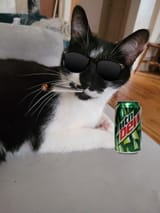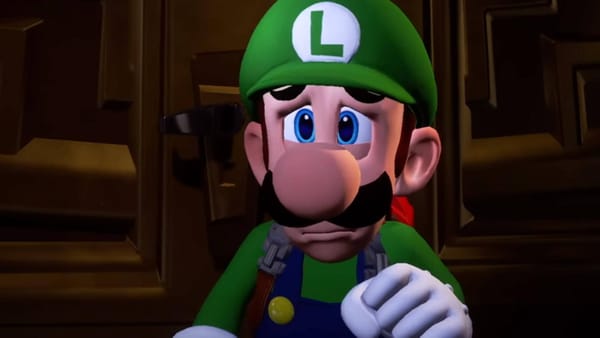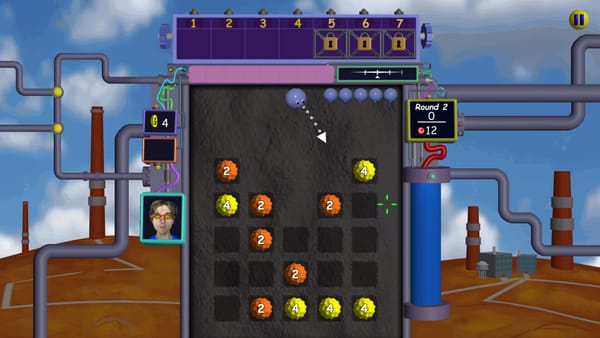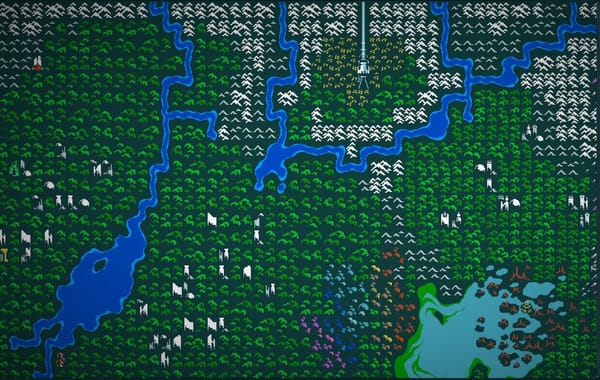The Lonely Apocalypse
...or how I learned to stop caring and reject solitude.
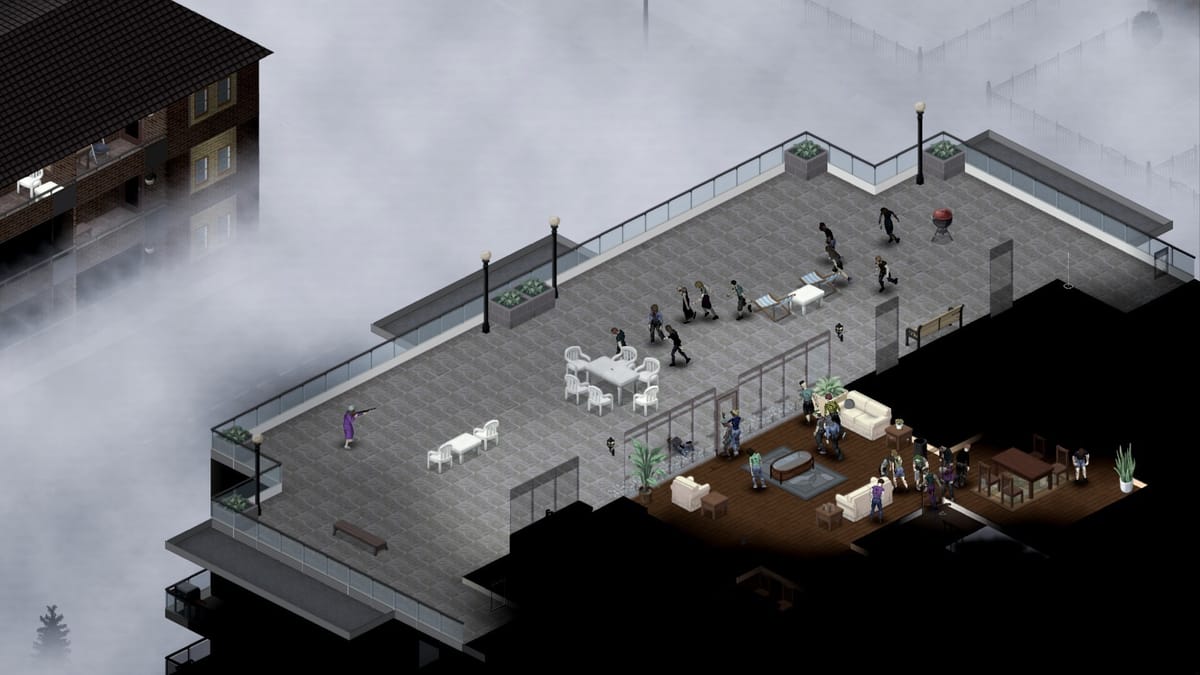
These are the end-times. There was no hope for survival. This is how you died.
You live in Muldraugh, a small town outside of Louisville. It is 1993, a few weeks before Independence Day, and you are heading to work when you get a whiff of a foul, moldy scent in the air, akin to rotten grain. It’s the talk of the town, but you and others forget about it right in time for July 4th celebrations. While you partake in beers and glizzies, commemorating American Imperialism and genocide, a new airborne virus spreads.
A few days go by, and news of strange occurrences begin to clog the airwaves. On the TV and radio: word of soldiers blocking the roads leading out of Knox County, where a “mild illness” makes its rounds amongst the populace. American citizens are being held at military camps on the Louisville border. You cannot get a hold of family or friends: the phone lines are out. Civilian channels are urging listeners to “barricade in their homes” and “avoid all contact” with infected individuals. The government falsely reassures the populace that the situation is “under control”.
You’re unsure how many days you’ve spent alone, chugging booze and anxiously absorbing the news. You count enough canned goods in your cupboard and fresh food in your fridge to last you for 5 days, maybe even a week with proper rationing. You grow tired of channel-surfing the TV, you’ve read all the books in your house cover to cover. What’s ailing you is the lack of human interaction, the boredom of your daily routine…and a hint of morbid curiosity.
You’ve had enough of boozing and loitering in your suffocating home. You determine to seek out company from your community. You step outside to a barren cul-de-sac. Families are probably holed up inside, waiting out this mysterious crisis. You notice your next-door neighbor is slouching on his front lawn, probably drunk.
You call out and approach him, but when he turns to face you: eyes dead, skin pale, wife-beater coated in blood; you notice a huge chunk of flesh is missing from his arm. A growl, a moan, and he slowly steps in your direction.
As he gets closer, you detect the stench of death and decay. He lunges and tries to bite you, but you push him away. You try to talk sense, with no luck. He lacerates you, leaving a deep, long cut down your forearm.
Terrified, bleeding, you run back home, and lock the door, clutching your wound. You hear the smash of a broken window, and the ghoul slowly rounds the corner into the kitchen. You arm yourself with the only usable weapon: a steel frying pan. You knock his head with it and he falls to the ground. A few seconds, and he stands back up. You hit him again, and again. He is on the floor now, and you beat his head in with the kitchen utensil until you hear his skull pop and his brains spill out.
You stand, in shock, while his blood decorates the floor. The ruckus has attracted other monsters. There’s a wild banging on the door, and the walking dead soon storm your domicile. Your wish has been granted: you are no longer alone. Reeling with pain, you manage to fight off a couple, until you’re cornered and devoured.
You have survived for 6 hours. You have killed: 3 zombies.
This is Project Zomboid, an early-access survival game from The Indie Stone, presented in a low-poly style from a top-down isometric view. It’s been in development for *checks notes*…over 10 years!? I like to call it a “zombie apocalypse simulation”. You create and customize one survivor at a time, choosing their pre-World-War-Z occupation (which informs which skills they excel in) as well as balancing positive and negative traits. It offers ample opportunity for engaging character builds: you can create a wakeful, strong, but slightly deaf lumberjack with a bad case of claustrophobia, or a pacifist doctor who is incredibly intelligent but too feeble and cowardly to fight off even a couple of zombies. You then spawn into an open-world infested with zombies, and attempt to survive for as long as you can. If your survivor dies, there are no checkpoints or restarts. You must start over with a completely new character. Craft, barricade, forage: you must try anything and everything to live.
Zomboid excels in its portrayal of the damned as shambling cadavers. It has exploded in popularity since the release of its latest build in 2021, quite late to the cultural zombie craze of the 2010s. The game succeeds in its depressing representation of loneliness: the psychological damage of surviving alone, while the world is in crisis. It’s a game that (at least in single player) forces you to become an individualist, and shows us the fate of selfishness in the face of apocalypse: death.
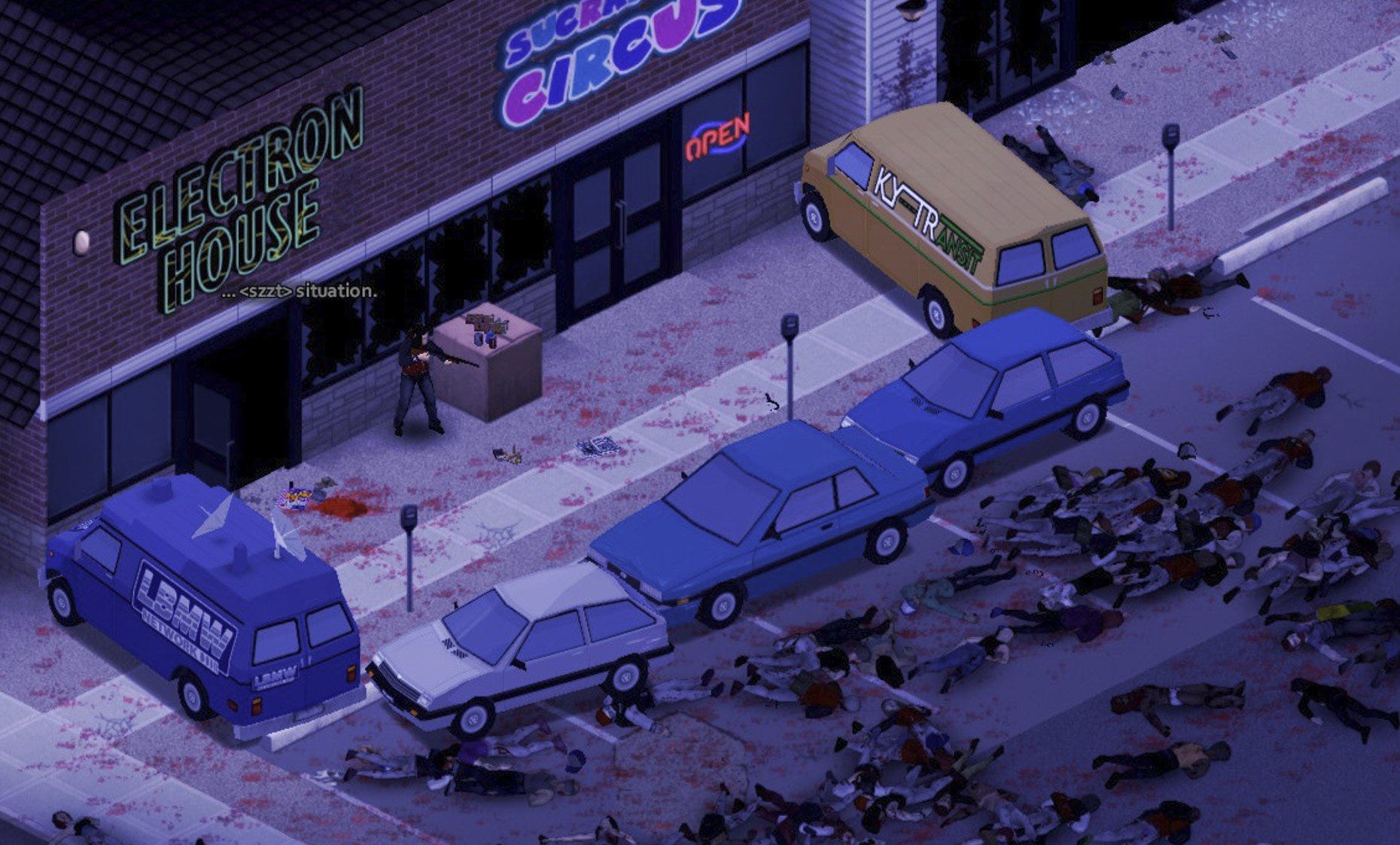
Project Zomboid is a game about necessity and desire. It shows us how these human motivators place us in deadly or violent situations due to resource scarcity. The first obstacles to overcome are rather banal: you must stave off starvation, dehydration and exhaustion. The first injury you receive is a mad scramble to figure out how to bandage and clean your wound. There’s a tangible excitement when you find your first car…which quickly deflates when you realize you need the keys and gasoline to get it running. Once that’s done: there’s no bigger joy than mowing down horde after horde with your truck, just make sure you don’t crash too often or run out of gas!
At first, you rely on fresh food and plentiful water, but soon, the electricity cuts out and the water-pipes stop flowing, leading to upped stakes, and the need to embark on riskier expeditions. You can power your home with a generator, but it requires fuel and constant maintenance…and you did remember to find and read “How to Use Generators”…right?
By contrast, the zomboids are the perfect antagonizing force. They are slow, easily outfoxed, but dangerous in large numbers. What differentiates them from other videogame zombies, is the way the game accentuates their presence. Even when they’re not around, you feel as though they are, as if one of those freaks can pop out behind you after a single, careless mistake, costing you your life.
You can only visualize them in the game world when they’re in your line of sight (or within earshot). When juxtaposed with the game’s low-poly aesthetic and the vast scope of its map, this mechanic creates the sensation that you can never survey your surroundings without fear.
The game does a wonderful job of moving hordes with properly paced, randomized background events. In the distance: late night trucks drive by, honking their horn and shooting zombies, a survivor screams as she’s devoured, and another trips a house alarm. This creates the illusion of other survivors in the world — even though you will never see another human being alive and well.
The omnipresent zombies, mixed with the inherent complexity of the gameplay, drive decision-making better than most fiction. The whole game serves as a vehicle for you to write your own story, and die your own death. The experience crafted in my head, during my solitary playthroughs, was one of desperation, hopelessness and isolation.
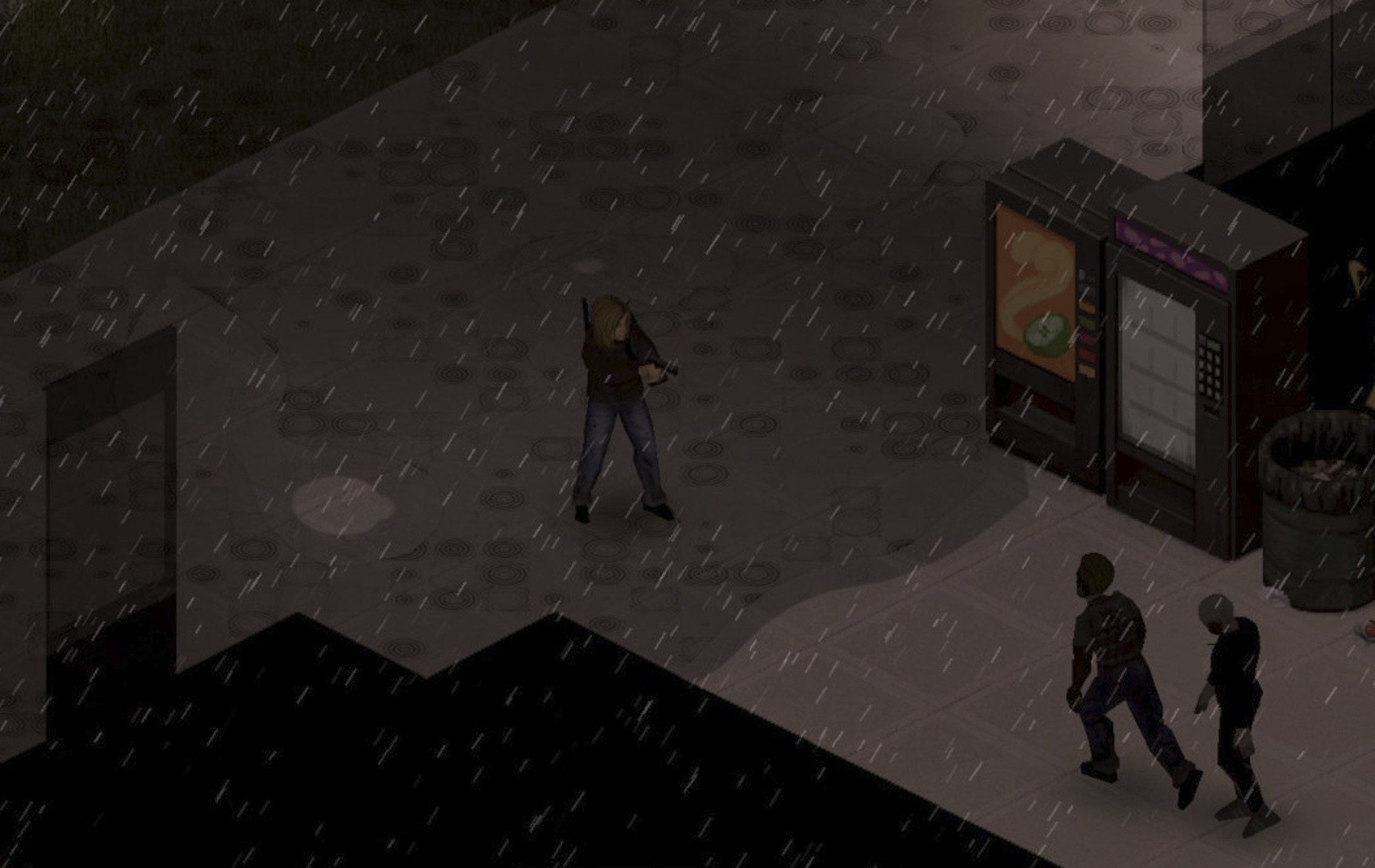
A solo playthrough of Project Zomboid is rugged survivalism. My first deaths were attained clinging to basic needs. I once stormed a house, desperate for food, and opened the front door to meet a zombie standing behind it. Soon after, a tasty morsel of my flesh was chomped off. I bled out, scavenging the neighborhood I spawned in for any medical supplies, perishing the moment I picked up a bandage.
Even after settling my base desires, I craved more. Boredom and stress are a survivor’s worst enemies. I have lost lives reaching for books. One of my fallen characters was over-encumbered and too exhausted to fight off a small group of zeds. She was attempting to lug a TV back home, so she could watch her vast VHS collection.
My longest-lasting character built a defensible base, powered by a generator with plenty of fuel. I set up rain-catchers, DIYed plumbing and had a renewable water source as a result. I planted a small vegetable garden. I had stockpiles of food, ammo, guns, books, melee weapons, tools, seeds, etc. I was self-sustaining, self-reliant, and found it easy to survive. I still wasn’t happy. I had everything a survivor needed, and yet I desired meaning in a lonely world. I set my sights on Louisville, the mecca of good loot, fully armed, in a car with plenty of gas, seeking nothing more than an adventure. I didn’t make it past the military blockade. It was the routine of isolation, and a desire to escape it, that killed me.
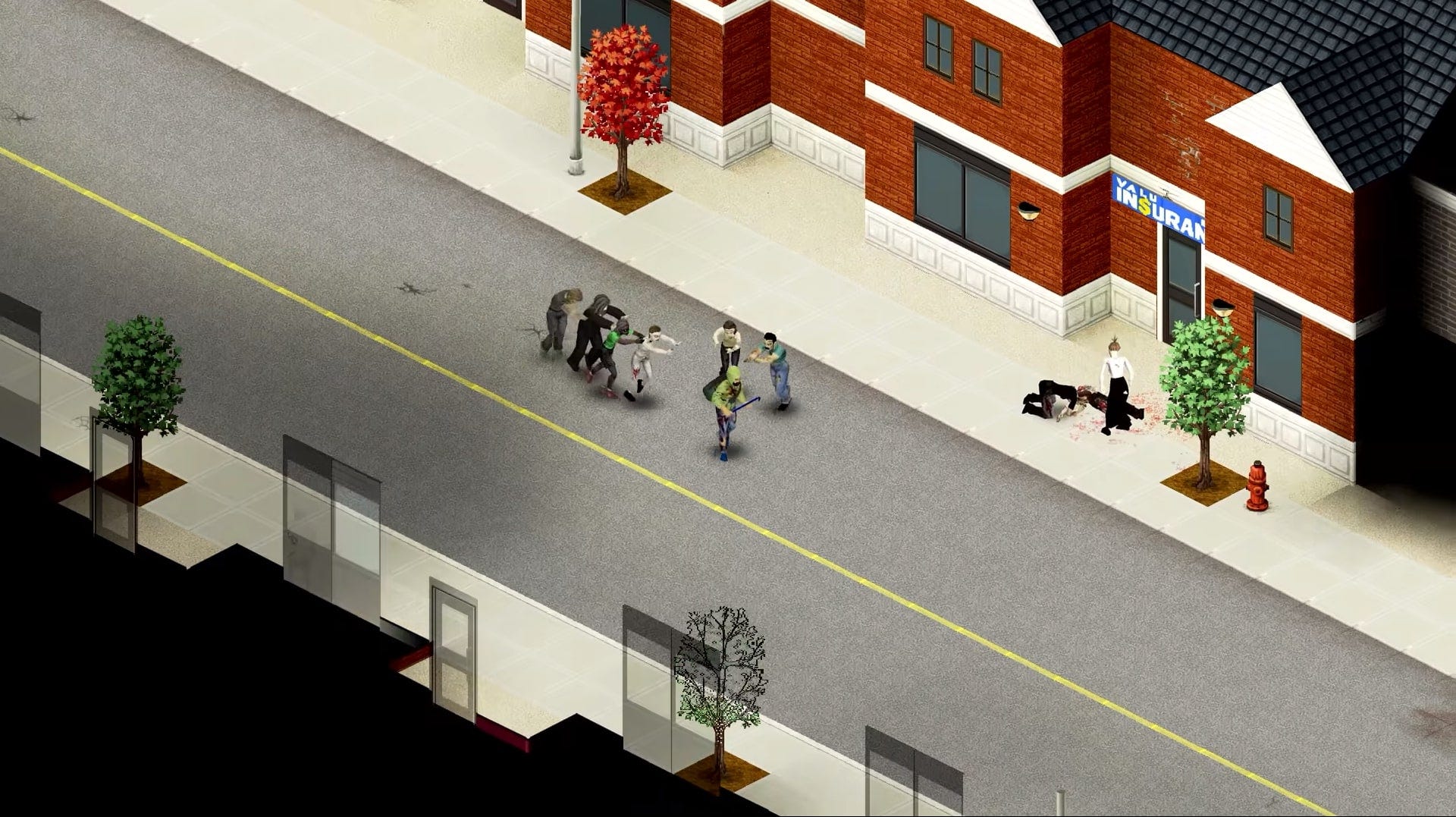
There is no definitive answer as to why the British-based developers of The Indie Stone settled on rural Kentucky as the game’s setting (I believe this was a choice born out of necessity, as designing a bustling metropolis wouldn’t have worked quite as well with the game’s isometric view and insane detail). In their vague interest for rural Americana, they uncovered the truth of American individualism.
In solo-Zomboid, the individual is all that matters. You are exceptional: all player-created characters are. You can survive the airborne strain of the virus: only direct fluid exchange by a zombie infects you. Your solitary survival leads to a mundane existence. The (un)dead make for poor company. I too have felt loneliness, abandonment. I suffered a deep loss of community; there is nothing for me back home. I have felt hunger pangs and suffered dehydration. When my base desires were satisfied, I felt stricken with ennui. I have suffered many deaths in the real world as well.
American exceptionalism has taught generations the value of self-fulfillment, self-empowerment and self-reliance; the obsession is always the “self”, the “I”. If there’s one product America exports along with death and devastation, it’s its self-aggrandizing culture. In Zomboid, the zombies don’t “kill” you: material needs and wants, and your attempts to satisfy them, put you in deadly situations. Otherwise: it’s because you are truly and utterly alone, desperately trying to keep the loneliness and boredom at bay.
The game pulls no punches: There was no hope[…]This is how you died. What purpose is there in a hopeless world, where you are destined to die? Our real, non-zombie world, is, too, mired in tragedy, and we all are heading the way of the deceased. Yet we find our own meaning in how we relate to each other, in how we can experience and add to the world. And we persist, with the help of others.
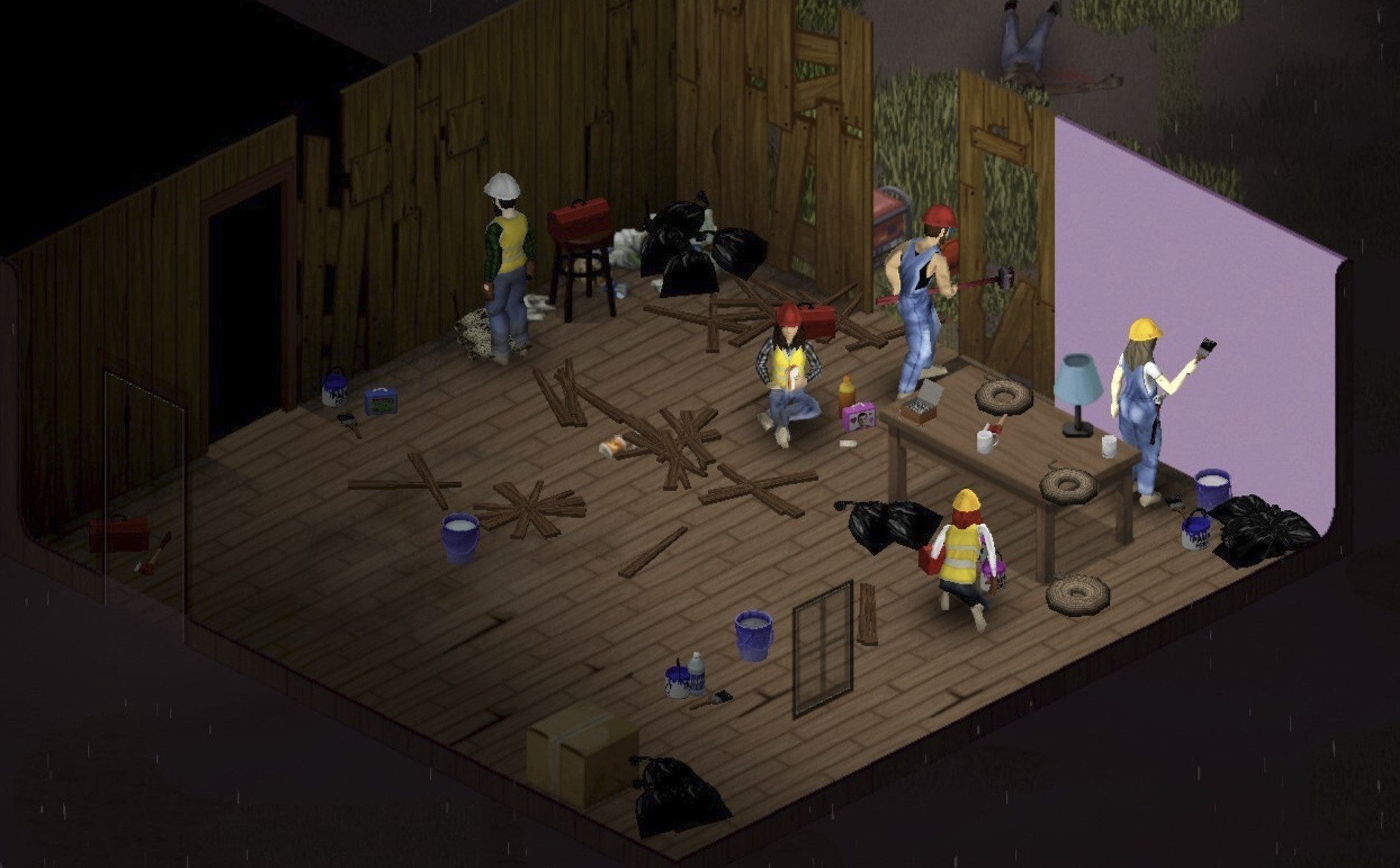
I might be a bit of a masochist, as I enjoy when art makes me feel like shit. That’s the main reason I enjoy brutal, punishing games. It’s probably why I like Zomboid so much too.
But, like life itself, Project Zomboid is better enjoyed with friends and family. I miraculously cajoled a handful of people to start a server with me and we have been zombie-killing it up in multiplayer for a while now. At the risk of sacrificing my whole point: playing this game with others isn’t much about long-term survival, but more the fun and shenanigans you experience along the way.
We vaguely roleplay, giving our characters silly voices and funny backstories. My friend loves putting on clown makeup every chance they get, my housemate always levels up her carpentry skill so she can “crank 90s like in Fortnite”. We can recount gnarly vehicular crashes and moments we purposefully got each other killed. When it comes time to help fend off a horde, carry a water dispenser back home, or give a lighter to a friend who badly needs a smoke, we are always there for each other. When I am hungry, I don’t have to brave a dead world. I can just ask my friend to drop me a can of chili. They’ll gleefully respond “Sure! Here you go!” and they’ll hide a laugh as I realize they’ve handed me dog food instead…

